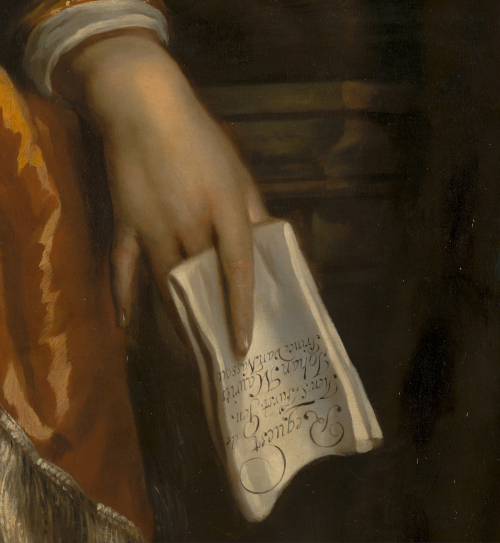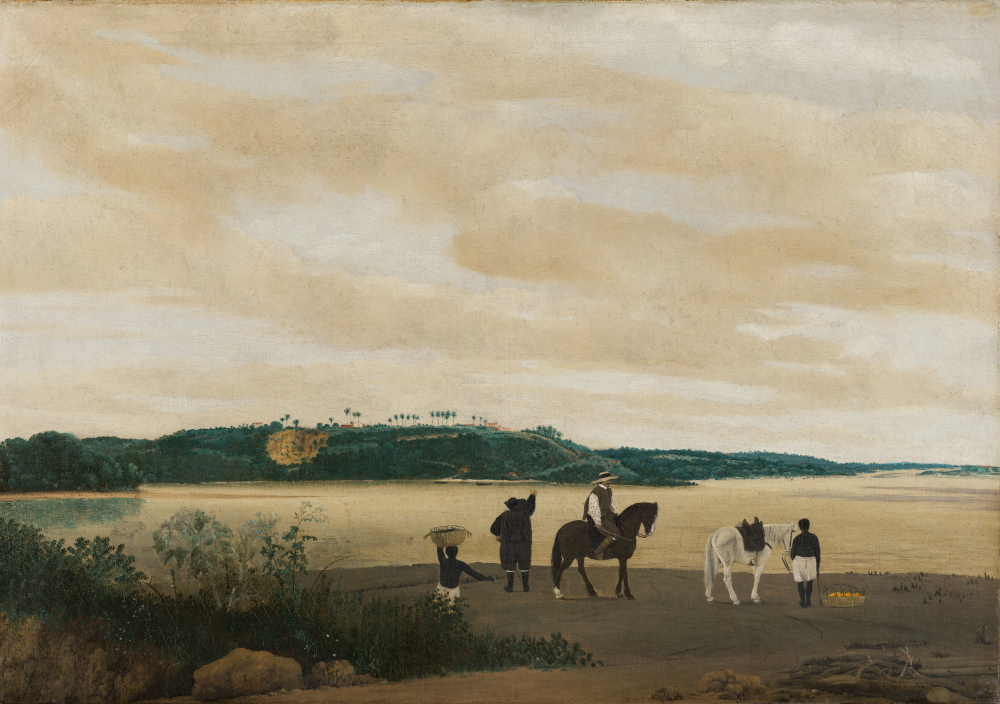
Detail from the portrait of Johan Maurits, Count of Nassau-Siegen,, by Jan de Baen. c. 1668–70. (The Mauritshuis, The Hague)
For those who would like to know more about Johan Maurits van Nassau-Siegen (1604–1679), the early modern figure at the centre of the latest batch of letters to be published in EMLO, it is worth reading the literature that surrounds the latest exhibition to open at the Mauritshuis. Or, better still, to carve out time to visit the museum should occasion arise in The Hague. Shifting Image — In Search of Johan Maurits examines the life of this Count of Nassau-Siegen from a number of pertinent and fresh perspectives.
Johan Maurits served as Governor-General at the Dutch Republic’s first large plantation colony in current-day Brazil. The colony, with its sugar plantations and mills, had been captured from the Portuguese and remained in the possession of the Dutch for a quarter of a century until 1654. The exploitation of, and the accumulation of vast profits from, the area form—as this exhibition investigates—’a crucial episode in the history of the Dutch slave trade’. In the context of the Governor’s life, the lens is brought to focus on his role in the trans-Atlantic slave trade. Johan Maurits left for Brazil in 1636. Over the course of the following eleven years, while the transport took place of thousands of men, women, and children from the west coast of Africa to the north-east coast of Brazil, the Mauritshuis was designed, built, and furnished in The Hague to the Governor’s specifications. Johan Maurits proved a considerable patron, encouraging such artists as Frans Post and Albert Eckhout, and commissioning Caspar Barlaeus and Franciscus Plante to write Rerum per octennium in Brasilia (1647) and Mauritias (1647) respectively. This exhibition questions how objective these artistic and literary interpretations of the Governor’s own role and the Dutch involvement in Brazil might be, given their purpose and dependence upon Johan Maurits’s funding. Not content merely with covering costs, Johan Maurits elected to keep a firm hand on the output of his munificence and in the creation of his own image, taking it upon himself to edit Barlaeus’s text. And in an approach that has not always been employed as a matter of course in the history of art and of patronage, visitors to the exhibition are asked to weigh up the probable reality underlying such landscapes as Post’s View of the Island of Itamaracá, the first known painting in which enslaved people are depicted in ‘Dutch Brazil’.

Detail from ‘Study of Two Brazilian Tortoises’, by Albert Eckhout. c. 1640. (The Mauritshuis, The Hague)
What survive as visual and written records of this colony at the time of Johan Maurits, partial though these might be, are nonetheless invaluable as documentary evidence for the individuals concerned. We are able to refer to the maps charted, to the illustrations and scientific descriptions of fauna and flora recorded, and—of course—to surviving correspondence. Johan Maurits left his post as Governor-General in 1644.
The forty-six letters uploaded to EMLO to coincide with this exhibition in Johan Maurits’s former residence have been contributed by Dr Ineke Huysman and her project team at the Huygens ING as part of their work on the correspondence inventory for Johan de Witt. Dating between 1653 and 1670, the letters are those sent from the former Governor-General to the Grand Pensionary of Holland, and each record is linked to an image of the manuscript held at the Nationaal Archief in The Hague. The synchronicity of the listing of these letters in EMLO and the exhibition at the Mauritshuis offers a timely opportunity to consider Johan Maurits both within the context of the work-in-progress catalogue of Johan de Witt and in the broader perspective of Dutch and of global history, contrasting—as this exhibition does so well—early modern attitudes and beliefs with those held today.


